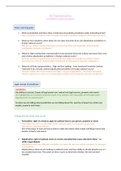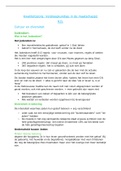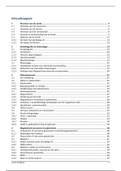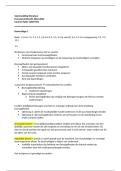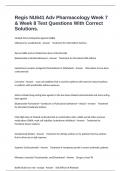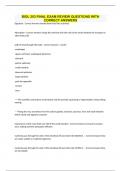HC3 international law
Jurisdiction and immunities
today’s learning goals:
1. What is jurisdiction and when does a State have prescriptive jurisdiction under international law?
Wat is jurisdictie en wanneer heeft een staat prescriptieve jurisdictie volgens het internationaal recht?
2. What are four situations when States do not enjoy immunity from civil adjudicative jurisdiction in
foreign national courts?
Wat zijn vier situaties waarin staten geen immuniteit genieten van burgerlijke rechtsmacht bij
buitenlandse nationale rechtbanken?
3. When do high-ranking State representatives have personal immunity (ratione personae) from civil
and criminal adjudicative jurisdiction in foreign national courts?
Wanneer genieten hooggeplaatste staatsvertegenwoordigers persoonlijke immuniteit (ratione
personae) van civiele en strafrechtelijke rechtsmacht bij buitenlandse nationale rechtbanken?
4. When do all State representatives – high and low-ranking – have functional immunity (ratione
materiae) from civil and criminal adjudicative jurisdiction in foreign national courts?
Wanneer hebben alle staatsvertegenwoordigers - hoog en laaggeplaatst - functionele immuniteit
(ratione materiae) van civiele en strafrechtelijke jurisdictie bij buitenlandse nationale rechtbanken?
Legal concept of jurisdiction
Jurisdiction
the ability to exercise 3 types of legal power over natural and legal persons, property and events
de mogelijkheid om 3 soorten juridische macht uit te oefenen over natuurlijke en rechtspersonen,
eigendommen en evenementen
So when we are talking about jurisdiction we are talking about the exercise of power by a state over
people, property and events.
3 things that the Dutch state can do:
1. Prescriptive: right of a State to apply its national laws to any person, property or event
Prescriptief: het recht van een staat om zijn nationale wetten toe te passen op personen,
eigendommen of gebeurtenissen
this is the power of each and every state to make laws about what is legal and illegal concerning
people, property and events
2. Adjudicative: right of national courts to receive and determine cases referred to them – to
settle a legal dispute
Adjudicative: recht van nationale rechtbanken om zaken die naar hen worden verwezen, te ontvangen
en te beslissen
Adjudicative is when we are looking at national courts and their ability to decide whether you or I
has violated Dutch law. The power of these courts to determine whether the law has been
violated
, 3. Enforcement: right of a State to physically enforce laws (e.g. arrest a person, seize property)
Handhaving: recht van een staat om wetten fysiek af te dwingen (bijv. Een persoon arresteren, beslag
leggen op eigendommen)
Enforcement is the power of a state to send it police officers in to the room and arrest one of us
today.
General rule: States are equal territorial units. They can exercise jurisdiction over people and property
on their own territory but not on one another’s territory each state is not supposed to interfere with
the territory with another states, or his people or events that happens on its territory
Why are we talking about jurisdiction today?
Well, the problem is in 2020 and long before, people and property move around and events that maybe
begin in 1 country are completed in another country. Think of a drug smuggler who producing drugs in
Canada, trafficking them to trough the UK and selling them in the Netherlands. So people, property and
events are spread out over more than 1 one state in some cases. And in that case international law asks
the question: who is allowed to assert jurisdiction?
Prescriptive jurisdiction
States may exercise prescriptive jurisdiction in criminal and civil cases only if facts support one of 5
principles:
Staten mogen alleen prescriptieve rechtsmacht uitoefenen in strafzaken en burgerlijke zaken als de feiten een
van de vijf principes ondersteunen
1. Territory: act occurs on a State’s territory - land, territorial sea, or air (special rules for aircraft
and ships) handeling vindt plaats op het grondgebied van een staat - land, territoriale zee of lucht
(speciale regels voor vliegtuigen en schepen)
If you can connect an event or a person to a state territory than you can say that the state on whose
territory something accursed it has jurisdiction.
a. Objective territoriality: act completed or has effects on territory (e.g., 9/11 attacks in the
US)
You can argue as a lawyer that your state has jurisdiction because the acts was completed on
your territory. This is the US that would argue: ´the twin towers attack accured on our
territory, we have now jurisdiction to prosecute the people responsible’
b. Subjective territoriality: act initiated or planned on territory (e.g., 9/11 planning in
Afghanistan)
But Afghanistan could also make an argument, they could argue subjective territoriality. They
could say: ´we should prosecute the terrorist because the planning and preparation of these
terrorist attacks accured on our territory. ´
2. Active personality (nationality): individual acting on or beyond State territory is a national of
the State Actieve persoonlijkheid (nationaliteit): natuurlijke persoon die op of buiten het
grondgebied van de staat handelt, is een staatsburger
Jurisdiction and immunities
today’s learning goals:
1. What is jurisdiction and when does a State have prescriptive jurisdiction under international law?
Wat is jurisdictie en wanneer heeft een staat prescriptieve jurisdictie volgens het internationaal recht?
2. What are four situations when States do not enjoy immunity from civil adjudicative jurisdiction in
foreign national courts?
Wat zijn vier situaties waarin staten geen immuniteit genieten van burgerlijke rechtsmacht bij
buitenlandse nationale rechtbanken?
3. When do high-ranking State representatives have personal immunity (ratione personae) from civil
and criminal adjudicative jurisdiction in foreign national courts?
Wanneer genieten hooggeplaatste staatsvertegenwoordigers persoonlijke immuniteit (ratione
personae) van civiele en strafrechtelijke rechtsmacht bij buitenlandse nationale rechtbanken?
4. When do all State representatives – high and low-ranking – have functional immunity (ratione
materiae) from civil and criminal adjudicative jurisdiction in foreign national courts?
Wanneer hebben alle staatsvertegenwoordigers - hoog en laaggeplaatst - functionele immuniteit
(ratione materiae) van civiele en strafrechtelijke jurisdictie bij buitenlandse nationale rechtbanken?
Legal concept of jurisdiction
Jurisdiction
the ability to exercise 3 types of legal power over natural and legal persons, property and events
de mogelijkheid om 3 soorten juridische macht uit te oefenen over natuurlijke en rechtspersonen,
eigendommen en evenementen
So when we are talking about jurisdiction we are talking about the exercise of power by a state over
people, property and events.
3 things that the Dutch state can do:
1. Prescriptive: right of a State to apply its national laws to any person, property or event
Prescriptief: het recht van een staat om zijn nationale wetten toe te passen op personen,
eigendommen of gebeurtenissen
this is the power of each and every state to make laws about what is legal and illegal concerning
people, property and events
2. Adjudicative: right of national courts to receive and determine cases referred to them – to
settle a legal dispute
Adjudicative: recht van nationale rechtbanken om zaken die naar hen worden verwezen, te ontvangen
en te beslissen
Adjudicative is when we are looking at national courts and their ability to decide whether you or I
has violated Dutch law. The power of these courts to determine whether the law has been
violated
, 3. Enforcement: right of a State to physically enforce laws (e.g. arrest a person, seize property)
Handhaving: recht van een staat om wetten fysiek af te dwingen (bijv. Een persoon arresteren, beslag
leggen op eigendommen)
Enforcement is the power of a state to send it police officers in to the room and arrest one of us
today.
General rule: States are equal territorial units. They can exercise jurisdiction over people and property
on their own territory but not on one another’s territory each state is not supposed to interfere with
the territory with another states, or his people or events that happens on its territory
Why are we talking about jurisdiction today?
Well, the problem is in 2020 and long before, people and property move around and events that maybe
begin in 1 country are completed in another country. Think of a drug smuggler who producing drugs in
Canada, trafficking them to trough the UK and selling them in the Netherlands. So people, property and
events are spread out over more than 1 one state in some cases. And in that case international law asks
the question: who is allowed to assert jurisdiction?
Prescriptive jurisdiction
States may exercise prescriptive jurisdiction in criminal and civil cases only if facts support one of 5
principles:
Staten mogen alleen prescriptieve rechtsmacht uitoefenen in strafzaken en burgerlijke zaken als de feiten een
van de vijf principes ondersteunen
1. Territory: act occurs on a State’s territory - land, territorial sea, or air (special rules for aircraft
and ships) handeling vindt plaats op het grondgebied van een staat - land, territoriale zee of lucht
(speciale regels voor vliegtuigen en schepen)
If you can connect an event or a person to a state territory than you can say that the state on whose
territory something accursed it has jurisdiction.
a. Objective territoriality: act completed or has effects on territory (e.g., 9/11 attacks in the
US)
You can argue as a lawyer that your state has jurisdiction because the acts was completed on
your territory. This is the US that would argue: ´the twin towers attack accured on our
territory, we have now jurisdiction to prosecute the people responsible’
b. Subjective territoriality: act initiated or planned on territory (e.g., 9/11 planning in
Afghanistan)
But Afghanistan could also make an argument, they could argue subjective territoriality. They
could say: ´we should prosecute the terrorist because the planning and preparation of these
terrorist attacks accured on our territory. ´
2. Active personality (nationality): individual acting on or beyond State territory is a national of
the State Actieve persoonlijkheid (nationaliteit): natuurlijke persoon die op of buiten het
grondgebied van de staat handelt, is een staatsburger


